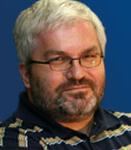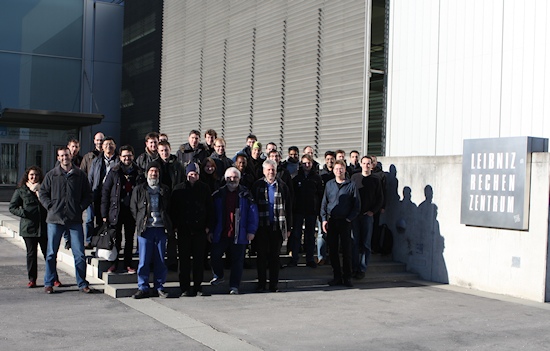Introduction to hybrid programming in HPC
PRACE PATC Course: Introduction to hybrid programming in HPC @ LRZ, 14.1.2016
Most HPC systems are clusters of shared memory nodes. Such SMP nodes can be small multi-core CPUs up to large many-core CPUs. Parallel programming may combine the distributed memory parallelization on the node interconnect (e.g., with MPI) with the shared memory parallelization inside of each node (e.g., with OpenMP or MPI-3.0 shared memory). This course analyzes the strengths and weaknesses of several parallel programming models on clusters of SMP nodes. Multi-socket-multi-core systems in highly parallel environments are given special consideration. MPI-3.0 has introduced a new shared memory programming interface, which can be combined with inter-node MPI communication. It can be used for direct neighbor accesses similar to OpenMP or for direct halo copies, and enables new hybrid programming models. These models are compared with various hybrid MPI+OpenMP approaches and pure MPI. Numerous case studies and micro-benchmarks demonstrate the performance-related aspects of hybrid programming.
Tools for hybrid programming such as thread/process placement support and performance analysis are presented in a "how-to" section. Hands-on exercises give attendees the opportunity to try the new MPI shared memory interface and explore some pitfalls of hybrid MPI+OpenMP programming. This course provides scientific training in Computational Science, and in addition, the scientific exchange of the participants among themselves.
The course is a PRACE Advanced Training Center event.
Location
Leibniz-Rechenzentrum
der Bayerischen Akademie der Wissenschaften (LRZ)
Boltzmannstr. 1
D-85748 Garching bei Muenchen
Course room II, H.U.010
How to get to the LRZ: see http://www.lrz.de/wir/kontakt/weg_en/
Lecturers
 |
Dr. Georg Hager (RRZE) |
 |
Dr. Rolf Rabenseifner (HLRS) |
Schedule
10:00 Welcome
10:05 Motivation
10:15 Introduction
10:45 Programming Models: Pure MPI
11:15 Coffee Break
11:35 MPI + MPI-3.0 Shared Memory (Talk + 2 Practicals)
13:10 Lunch
14:10 MPI + OpenMP
15:10 Coffee Break
15:30 MPI + OpenMP continued (Talk + Practical)
16:00 MPI + Accelerators
16:15 Tools
16:25 Conclusions
16:45 Q&A
17:00 End
Organisation & Contact
Dr. Volker Weinberg (LRZ)
Registration
Via the PATC page.
Slides
MPI+X - Hybrid Programming on Modern Compute Clusters with Multicore Processors and Accelerators
Final Remarks (LRZ)
Exercises
The exercises about the MPI shared memory can be found in MPI.tar.gz as described in
https://fs.hlrs.de/projects/par/par_prog_ws/practical/README.html
i.e., in the file
https://fs.hlrs.de/projects/par/par_prog_ws/practical/MPI.tar.gz
and there in the subdirectories MPI/course/*/1sided with
* = C for the C intterface,
* = F_20 for the old Fortran mpi module, and
* = F_30 for the new Fortran mpi_f08 module.
The 2nd exercise block about hybrid MPI+OpenMP can be found in
https://fs.hlrs.de/projects/par/par_prog_ws/practical/2016-HY-G-GeorgHager-Jacobi-w-MPI+OpenMP.tgz
with pure MPI code in the C and Fortran directories and the hybrid MPI+OpenMP Version in the solution sub-directories.
Evaluation
Please fill out after the course:
https://events.prace-ri.eu/event/450/evaluation/
Further courses and workshops @ LRZ
LRZ is part of the Gauss Centre for Supercomputing (GCS), which is one of the six PRACE Advanced Training Centres (PATCs) that started in 2012.
Information on further HPC courses:
- by LRZ: http://www.lrz.de/services/compute/courses/
- by the Gauss Centre of Supercomputing (GCS): http://www.gauss-centre.eu/training
- by the PRACE Advanced Training Centres (PATCs): http://www.training.prace-ri.eu/


